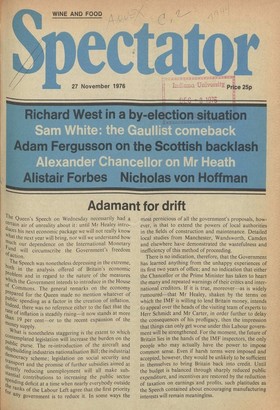Adamant for drift
The Queen's Speech on Wednesday necessarily had a e,ertain air of unreality about it : until Mr Healey introCILICeS his next economic package we will not really know what the next year will bring, nor will we understand how nip Lich our dependence on the International Monetary und will circumscribe the Government's freedom of action.
b The Speech was nonetheless depressing in the extreme, Pth in the analysis offered of Britain's economic Problem and in regard to the nature of the measures which the Government intends to introduce in the House c'r Commons. The general remarks on the economy Pr ePared for the Queen made no mention whatever of Pi ublie spending as a factor in the creation of inflation. rndeed, there was no reference either to the fact that the "late of inflation is steadily rising—it now stands at more h, a n 19 per cent --or to the recent expansion of the '°IleY supply. What is nonetheless staggering is the extent to which pontemplated legislation will increase the burden on the sisli.blic purse. The re-introduction of the aircraft and d'uPbuilding industries nationalisation Bill; the industrial trenlocracy scheme; legislation on social security and diallsPort and the promise of further subsidies aimed at strectlY reducing unemployment will all make subs'antial contributions to increasing the public sector trlending deficit at a time when nearly everybody outside foe ranks of the Labour Left agree that the first priority r any government is to reduce it. In some ways the most pernicious of all the government's proposals, however, is that to extend the powers of local authorities in the fields of construction and maintenance. Detailed local studies from Manchester, Wandsworth, Camden and elsewhere have demonstrated the wastefulness and inefficiency of this method of proceeding.
There is no indication, therefore, that the Government has learned anything from the unhappy experiences of its first two years of office; and no indication that either the Chancellor or the Prime Minister has taken to heart the many and repeated warnings of their critics and international creditors. If it is true, moreover—as is widely rumoured—that Mr Healey, shaken by the terms on which the IMF is willing to lend Britain money, intends to appeal over the heads of the visiting team of experts to Herr Schmidt and Mr Carter, in order further to delay the consequences of his profligacy, then the impression that things can only get worse under this Labour government will be strengthened. For the moment, the future of Britain lies in the hands of the IMF inspectors, the only people who may actually have the power to impose common sense. Even if harsh terms were imposed and accepted, however, they would be unlikely to be sufficient in themselves to bring Britain back into credit. Until the budget is balanced through sharply reduced public expenditure, and incentives are restored by the reduction of taxation on earnings and profits, such platitudes as the Speech contained about encouraging manufacturing interests will remain meaningless.










































